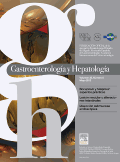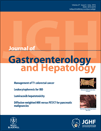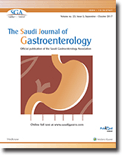
Intestinal Research
Scope & Guideline
Connecting Researchers to Transform Intestinal Health
Introduction
Aims and Scopes
- Investigation of Inflammatory Bowel Diseases (IBD):
The journal consistently publishes research on the clinical characteristics, treatment approaches, and long-term outcomes of IBD, particularly Crohn's disease and ulcerative colitis. - Clinical Trials and Real-World Studies:
There is a strong emphasis on both randomized controlled trials and real-world observational studies that evaluate the efficacy and safety of various therapies for IBD, including biologics and small molecules. - Innovative Diagnostic Approaches:
The journal highlights studies utilizing advanced imaging techniques, biomarkers, and endoscopic methods to improve diagnosis and monitoring of gastrointestinal diseases. - Multidisciplinary Perspectives:
Research often incorporates insights from gastroenterology, immunology, nutrition, and surgery, reflecting a holistic approach to managing gastrointestinal disorders. - Focus on Asian Populations:
A significant portion of the research addresses the unique clinical characteristics and treatment responses in Asian populations, contributing valuable data to the global understanding of IBD.
Trending and Emerging
- Biomarkers and Precision Medicine:
An increasing number of studies focus on identifying biomarkers that predict treatment response and disease progression, suggesting a trend towards precision medicine in managing IBD. - Impact of Gut Microbiota:
Research exploring the role of gut microbiota in IBD pathogenesis, treatment response, and overall health is gaining momentum, indicating a growing interest in microbiome-targeted therapies. - Mental Health and Quality of Life:
There is a rising emphasis on the psychosocial aspects of living with IBD, including mental health issues and quality of life assessments, reflecting a holistic approach to patient care. - COVID-19 and IBD Patients:
Research examining the effects of COVID-19 on patients with IBD has emerged as a significant theme, particularly regarding vaccination impacts and disease management during the pandemic. - New Therapeutic Agents:
The exploration of novel therapeutic agents, including JAK inhibitors and other small molecules, is becoming increasingly prevalent, as researchers seek to expand treatment options for refractory cases.
Declining or Waning
- Traditional Medical Therapies:
There is a noticeable decline in studies focusing exclusively on traditional medical therapies like corticosteroids, as newer treatment options such as biologics and small molecules gain prominence. - Basic Science Research:
The journal has shifted its focus away from purely basic science studies, particularly those that do not directly translate into clinical practice or patient outcomes. - Epidemiological Studies:
While still present, there appears to be a decrease in the publication of broad epidemiological studies related to IBD, possibly due to an increased emphasis on targeted clinical trials and specific therapeutic interventions. - Single-Center Studies:
There is a diminishing trend in the publication of single-center studies, as the journal increasingly favors multicenter collaborations that offer broader data and more robust conclusions. - Case Reports:
The frequency of case reports has declined, likely due to a preference for studies that provide larger datasets and more generalizable findings.
Similar Journals

Gastroenterologia y Hepatologia
Unveiling insights that shape the future of digestive health.Gastroenterologia y Hepatologia, published by Elsevier España SLU, is a distinguished journal dedicated to advancing the fields of gastroenterology and hepatology. With a publication history spanning from 1982 to 2024, this journal is recognized for its commitment to disseminating high-quality research and reviews that address critical developments in the diagnosis and treatment of gastrointestinal and liver diseases. Although it currently ranks in the Q3 quartile in both gastroenterology and hepatology based on the 2023 metrics, the journal continues to attract a global audience of researchers, healthcare professionals, and students eager to engage with the latest findings. The journal is accessible in both print and electronic formats (ISSN: 0210-5705), making its valuable insights reachable to a broad spectrum of subscribers. By fostering a platform for rigorous scholarly communication, Gastroenterologia y Hepatologia plays a vital role in shaping the future of research in these essential medical fields.

Clinical Gastroenterology and Hepatology
Unveiling New Horizons in Gastroenterology and HepatologyClinical Gastroenterology and Hepatology, published by Elsevier Science Inc, stands as a leading journal in the fields of gastroenterology and hepatology. With an ISSN of 1542-3565 and an E-ISSN of 1542-7714, this esteemed publication has earned its place in the top quartile (Q1) of both gastroenterology and hepatology categories as of 2023, ranking 6th out of 167 and 7th out of 82 respectively. The journal aims to disseminate innovative research, clinical studies, and case reports that advance the understanding and treatment of gastrointestinal and liver diseases. Targeted towards researchers, healthcare professionals, and students, it provides crucial insights into emerging therapies and medical advancements. Clinical Gastroenterology and Hepatology is not only a pivotal resource for contemporary gastroenterological research but also fosters collaboration and knowledge-sharing within the medical community. With a converging publication history from 2003 to the present, the journal continues to build on its solid foundation of scientific excellence and relevance.

INFLAMMATORY BOWEL DISEASES
Connecting science and clinical practice for better outcomes.INFLAMMATORY BOWEL DISEASES is a premier journal published by Oxford University Press, Inc., dedicated to advancing research within the fields of gastroenterology and immunology. With an impressive impact factor reflecting its status as a Q1 category journal in both gastroenterology and immunology and allergy, it ranks 17th out of 167 in gastroenterology and 53rd out of 233 in immunology, underscoring its influence and authority within the scientific community. Since its inception in 1995 and continuing through to 2024, the journal has become an essential resource for researchers, healthcare professionals, and students, serving as a platform for the latest findings in the diagnosis, treatment, and management of inflammatory bowel diseases. While the journal operates under a subscription-based model, it is recognized for its rigorous peer-review process and commitment to publishing high-caliber, impactful studies that contribute significantly to understanding and treating these complex conditions.

GASTROENTEROLOGY CLINICS OF NORTH AMERICA
Elevating Clinical Practice in GastroenterologyGASTROENTEROLOGY CLINICS OF NORTH AMERICA, published by W B SAUNDERS CO-ELSEVIER INC, stands as a leading journal in the field of gastroenterology, boasting a prestigious Q1 classification in its category for 2023. With an impressive Scopus ranking of 33 out of 167 and occupying the 80th percentile, it serves as a vital resource for researchers, professionals, and students dedicated to advancing knowledge and practice in gastroenterology. This journal, with ISSN 0889-8553 and E-ISSN 1558-1942, has been disseminating cutting-edge research and clinical insights since its inception in 1987, with ongoing relevance into 2024. Although not an open-access journal, it ensures accessibility through institutional subscriptions, providing a platform for high-impact articles that address contemporary challenges and innovations in gastroenterology. The journal’s steadfast commitment to promoting evidence-based medicine makes it an invaluable resource for those aiming to enhance patient care and expand the frontiers of gastrointestinal health.

JOURNAL OF GASTROENTEROLOGY AND HEPATOLOGY
Advancing knowledge in gastrointestinal and liver health.Welcome to the JOURNAL OF GASTROENTEROLOGY AND HEPATOLOGY, an esteemed publication in the field of gastroenterology and hepatology, proudly published by WILEY. Established in 1986, this journal serves as a crucial platform for researchers, healthcare professionals, and students, presenting groundbreaking research and comprehensive reviews that drive advances in understanding and treating gastrointestinal and liver diseases. With a strong reputation evidenced by its Q1 ranking in gastroenterology and Q2 ranking in hepatology, this journal ranks impressively in the Scopus metrics - positioned at #22 out of 167 in gastroenterology and #21 out of 82 in hepatology, reflecting its contribution to scholarly excellence. Although it does not offer open access options, the journal’s rich archive and diverse topics make it indispensable for those dedicated to improving patient outcomes in these critical areas of medicine. Whether you are a seasoned researcher or an aspiring medical professional, engaging with this journal will keep you at the forefront of the latest developments and emerging trends in gastroenterology and hepatology research.

Minerva Gastroenterology
Championing Open Access for Groundbreaking DiscoveriesMinerva Gastroenterology, published by EDIZIONI MINERVA MEDICA, is a notable academic journal dedicated to advancing the field of gastroenterology and related disciplines. With an ISSN of 2724-5985 and an E-ISSN of 2724-5365, this journal gathers innovative research from diverse areas including internal medicine, endocrinology, and metabolism. Though characterized by its open-access policies, Minerva Gastroenterology aims to provide a platform for high-quality scholarly articles with an emphasis on critical reviews, clinical studies, and translational research. Since its inception in 2021, the journal has managed to secure a reputation reflected in its Q3 rank across multiple categories in 2023, as well as its standing in Scopus rankings, positioning it in the 45th to 47th percentile among renowned medical journals. Situated in Turin, Italy, it fosters collaboration and knowledge-sharing among researchers and practitioners, making it an essential resource for those seeking to deepen their understanding of gastroenterological conditions and enhance clinical practices.

Crohns & Colitis 360
Championing collaboration in Crohn's and colitis research.Crohns & Colitis 360, published by Oxford University Press, is a leading open access journal that has been at the forefront of gastrointestinal research since its launch in 2019. With an E-ISSN of 2631-827X, this journal aims to foster innovation and collaboration within the field of gastroenterology, focusing on diseases such as Crohn's disease and ulcerative colitis. As of 2023, it has earned a commendable Q2 ranking in the gastroenterology category, positioning it among the top 50% of journals in its field, with a Scopus rank of 99 out of 167. Crohns & Colitis 360 not only provides a platform for peer-reviewed research but also seeks to disseminate clinical guidelines, reviews, and groundbreaking studies, making it an essential resource for researchers, healthcare professionals, and students dedicated to advancing the understanding and treatment of inflammatory bowel diseases. Emphasizing accessibility, the journal has been open access since its inception, ensuring that cutting-edge research is readily available to a global audience. This commitment to knowledge sharing significantly enhances its impact and relevance in the ever-evolving landscape of gastroenterology.

Gastroenterology Research
Advancing gastroenterology through innovative research.Gastroenterology Research is a prominent scholarly journal dedicated to advancing the field of gastroenterology. Published by ELMER PRESS INC, this journal serves as a vital platform for disseminating innovative research, clinical findings, and comprehensive reviews that explore the complexities of the gastrointestinal system. With an ISSN of 1918-2805 and an E-ISSN of 1918-2813, it reaches a global audience of researchers, healthcare professionals, and students eager to contribute to or keep abreast of the latest developments in gastroenterology. Though details such as the H-index and Scopus rankings are currently unspecified, the journal's commitment to quality and impact in the medical research community is evident. Gastroenterology Research aims to foster collaboration and knowledge sharing among experts, ultimately improving patient care and outcomes within this critical area of health science. Explore the cutting-edge studies published within its pages and engage with a community passionate about the investigation and treatment of gastrointestinal diseases.

Saudi Journal of Gastroenterology
Championing open access to vital gastroenterological findings.The Saudi Journal of Gastroenterology is a premier platform dedicated to advancing research and clinical practice in the field of gastroenterology. Published by Wolters Kluwer Medknow Publications, this open-access journal has been serving the academic community since 1995 from its base in India. With an ISSN of 1319-3767 and an E-ISSN of 1998-4049, the journal allows unrestricted access to a wealth of knowledge, fostering an environment where researchers, professionals, and students can engage with cutting-edge studies. As of 2023, it is categorized in the Q3 quartile within gastroenterology, ranking #74 out of 167 in Scopus, which places it within the 55th percentile of its field. The journal aims to disseminate significant findings, clinical trials, and innovative theories that shape the understanding of gastrointestinal disorders and practices. With a commitment to quality and relevance, the Saudi Journal of Gastroenterology is pivotal for anyone seeking to enhance their knowledge and expertise in this vital area of medicine.

United European Gastroenterology Journal
Transforming insights into impactful healthcare solutions.The United European Gastroenterology Journal, published by John Wiley & Sons Ltd, is a leading publication in the fields of gastroenterology and oncology, boasting a distinguished Q1 ranking in both categories for 2023. With an ISSN of 2050-6406 and an E-ISSN of 2050-6414, this journal serves as a vital platform for disseminating cutting-edge research and innovative practices from 2013 to 2024, supporting the advancement of knowledge in gastrointestinal health and cancer treatment. With a commendable Scopus Rank of 14th out of 167 in gastroenterology and 54th out of 404 in oncology, it emphasizes the significance of impactful research in these critical areas. While currently not an open-access journal, it remains a vital resource for researchers, professionals, and students seeking comprehensive insights and evidence-based approaches to improve patient care and clinical outcomes. The United European Gastroenterology Journal is committed to bridging the gap between research and practice, making it an essential reference for those dedicated to the fields of gastroenterology and oncology.